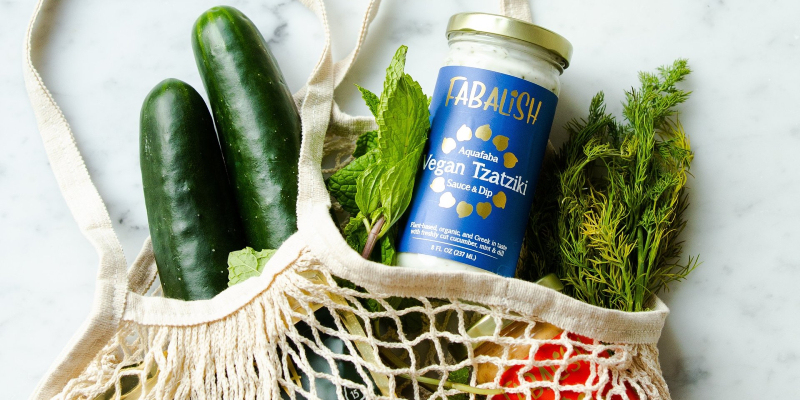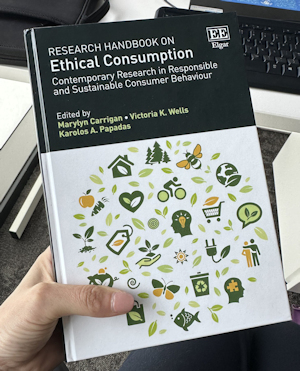Eight steps to become a more sustainable and ethical consumer
A new book, The Research Handbook on Ethical Consumption, explores the challenges and complexities of living an ethical and sustainable live, using cutting-edge research and insights from a range of leading academic experts.

In their new book, the Research Handbook on Ethical Consumption, co-authors Professor Victoria Wells and Dr Karolos A. Papadas, alongside fellow author Professor Marylyn Carrigan of Edinburgh Business School, present eight easy and practical ideas that anyone can follow to become a more sustainable and ethical consumer.
Radio interview
Listen to Professor Victoria Wells talking about the book on BBC Radio Humberside (from 3:46:05).

Make responsible seafood choices
While choosing to go vegan or vegetarian will significantly help the planet, there are ways to still eat fish responsibly and help sustainability by diversifying our diet. In the UK 80% of the seafood we eat comes from just five species – cod, haddock, prawns, salmon and tuna. Relying on such a small range of varieties places pressure on wild fish numbers and can lead to unsustainable farming practices.
So, try making a fish swap – replace your normal salmon with another oily fish like herring, anchovy or sardines or hand caught UK mackerel. Or, swap cod for hake, pollock or coley, or choose pot-caught UK langoustines or rope farmed mussels. Your local fishmonger can advise on sustainable choices and cooking tips as well as helping to prepare the fish.
Never throw away another coffee cup
An estimated 2.5–5 billion single-use takeaway cups are disposed of each year in the UK, most with a poly-coated plastic lining that interferes with recycling possibilities, causing most cups to be either incinerated or go into landfill.
Single use takeaway cups will never be completely sustainable, so using your own reusable cup is the only way to reduce the carbon footprint of your takeaway experience. You can also improve your sustainability by choosing a reusable cup made from natural, or recycled materials, such as the ecoffeecup®.
The coffee is black but the cup should be green and ethically sourced!
Eat ethically
Going vegan or vegetarian is a sure way to improve your ethical and sustainable eating. But if you’re not yet a vegan or vegetarian, why not choose to not eat meat once a week (for example meat-free Monday) or choose a non-meat option when eating out.
If you’re in a transition stage to become vegan/vegetarian or embracing being ‘flexitarian’, choosing the right place when you go out can help embed it as a habit. The in-store environment and options provided in social events play a role in shaping our ethical behaviour, so picking the gym that offers vegan options or going to the cinema that offers vegan food can make 'veganising' your appetite easier!
Become a minimalist family
The market for toys is huge worldwide, but it is estimated that up to 8% of these toys end up in incinerators, landfill or the ocean, making then an extremely unsustainable product. On top of this, over 180 million pieces of children's clothing are thought to end up in landfill each year.
However, because of how quickly children grow out of both toys and clothes, there is often a lot of life left in them. Choosing to donate via charity, local give and take events, or local freecycle groups can therefore be much better both ethically and sustainably. Renting rather than buying is also a good option with organisations like Whirli offering toy swap subscriptions and Borro offering rental clothes services for babies.
Finally, if you do decide to buy, look out for more sustainable and ethical toy and clothing brands such as Envirotoy or My Little Green Wardrobe.
Wear second hand clothes
Buying or swapping second-hand clothes helps the planet by avoiding garments ending up in landfill or incineration, reducing carbon emissions, saving resources, water, and energy. They also cost a lot less than new! But in the UK, even those of us who have bought second-hand still only have 1-10% of our wardrobe consisting of second-hand clothes.
Ideally, we should wear the clothes that we have more, repair them, and wash them at lower temperatures (30 instead of 40 degrees) and only when they are dirty enough.
But how should we find new clothes in sustainable ways? Clothes swaps are one alternative, and organisations such as Manchester-based Stitched Up, a not-for-profit community benefit society that provides a regular programme of clothes swapping events (as well as sewing, mending and up-cycling workshops), can help.
Clothes swapping apps such as Vinted or Depop are also good resources. Children's clothes swaps are increasingly popular, such as the Berwickshire Swap in Scotland, a local charity that organises monthly children’s clothing swaps of outgrown uniforms and other items.
Look for eco-labels on food
It's time to get eco-label savvy! Many grocery products use eco-labelling to make sustainability and ethical claims about their products, ingredients and supply chains.
One example is the Fairtrade label, often seen on coffee and chocolate, which denotes that the product works in accordance with Fairtrade standards relating to producers in lower income countries. Another often seen in the UK is the Red Tractor label, which denotes that products have been responsibly sourced, safely produced and come from crops and animals that have been well cared for.
Research shows that consumers have low knowledge of all but the biggest sustainability and ethical labels on grocery products, so why not try to get more educated? If there is a particular food or drink you consume a lot, find out more online about whether there is a relevant sustainability label to support better practices in its production and farming.
Get crafty
Consumers can embrace the craftivism movement by (re)discovering skills such as knitting and sewing, or mending to extend the life of clothes that may be lying in the cupboard unused. If you don’t know how to, there are repair workshops around the country such as the Falkirk Sewing Studio.
Alternatively, take your clothes to your local tailors or menders who can patch jeans or rework styles on old clothes to revamp your existing wardrobe – helping you to save money and the planet!
If you are buying something new, try sourcing from businesses such as The Well Worn or Community Clothing that produce limited edition and ethically made clothes in the UK using vintage, deadstock or sustainable fabrics. As well as new garments made from old or waste fabrics, they provide a mended denim range reworking vintage garments such as Levi jeans.
Transform your transport
With e-bikes and e-scooters, as well as bike and car rental schemes, now available in many big cities alongside traditional public and private transport options, there are more choices than ever for travellers. However, understanding which is the most sustainable is not always straightforward.
While e-bikes and e-scooters offer a flexible option for those who are less able to cycle standard bikes or walk, and while day to day they are more sustainable than using a private car, when a full lifecycle analysis – including build and moving bikes/scooters around to meet demand – is taken into account, it is still likely to be more sustainable to walk or take shared public transport.
So, walk if you can, as it is best for the environment and your own health. If this is not an option, first consider shared public transport, but if that doesn’t suit you then e-bikes and e-scooters are better options than private cars (especially non-electric ones).
Notes to editors:
Please contact William Davis at Insight Media at wdavis@insightm.co.uk to arrange interviews or for any further information.